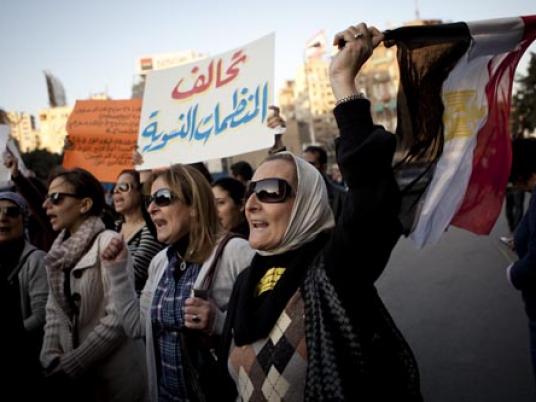
Members of the Constituent Assembly agreed last week to remove a proposed article which provided some constitutional support for gender equality — provided that such equality did not violate the provisions of Islamic Sharia law.
The episode showed the ability of both liberals and ultra-conservative Salafis to stamp their mark on a constitution-writing process dominated by the Muslim Brotherhood.
Secularists had objected to women’s rights being made conditional on Sharia.
This, they argued, would endanger the whole concept of equality, and could be used as a backdoor to strip women of civil and political rights they have already gained, like the right to be nominated for presidential elections or to hold high government positions, as well as the right to work and education.
Salafi forces, meanwhile, believed that openly granting the right of gender equality without restrictions was a Western idea that would endanger the provisions of Sharia, and would encourage secularists to challenge laws permitting polygamy or change Sharia-compliant inheritance laws.
Removing the article was thus seen as a compromise between the two bitterly opposed factions.
But both gender equality and Sharia are still referenced in the current draft of the constitution.
Article 2 stipulates that the principles of Sharia law are the main source of legislation, while Article 30 states that citizens are equal before the law, with no distinction based on gender, origin, language, religion, dogma, opinion, social status, or disability.
Freedom and Justice Party leader and Constituent Assembly member Amr Darrag said in media reports that the Salafi forces’ fears are unfounded because of Article 2, while secular forces should be reassured by Article 30.
Activist Marwa Sharaf al-Din says, although she is still worried, this could be the best solution available for Egyptian women, given that an article preventing discrimination is present in the draft.
“Ideally, the state should not be only obliged to prevent discrimination, but to protect gender equality as well, given the huge problems women face in our society,” she explains.
Sharaf al-Din says that one general article about discrimination is not enough, calling for specific amendments to target the “atrocities women suffer in society.”
“The constitution is not just a solid legal statement, but a statement of principles as well,” she adds. “Granting the very basic principle of equality for women sends a strong signal to society that this constitution really protects them.”
But others are worried over the omission of an article guaranteeing equality between men and women.
Researcher at Nazra for Feminist Studies Fatma Emam believes that the removal of the whole article regarding the equality of women, which was part of the 1971 Constitution, is worrying.
Although Sharia should bring more rights for women, argues Emam, who calls herself an Islamic feminist, the current majority of political forces, she believes, support an interpretation of Sharia which would threaten women’s rights, rather than defend them.
“I’m not terrified of Sharia like many women’s rights activists, but what worries me most is who will implement it and according to what understanding. The discourse of Islamist movements is not promising at all,” she says.
Sharaf al-Din agrees.
“Sharia is God’s message to the universe which will remain eternal and will never change. Provisions of Sharia are human efforts to understand and interpret Sharia, and these can change,” she explains, adding that it is difficult to implement interpretations of Sharia from 14 centuries ago in the present.




